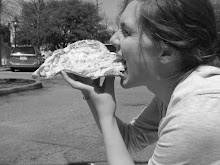There's no doubt that Franklin did something right, that he hit some chord that reverberated in editors' souls everywhere. Unfortunately, I didn't swoon at Franklin's prose--which made reading the 200-something page book a little painful. From the beginning, I was put off by what I read as Franklin's arrogance. Yes, he won two Pulitzer Prizes, and that's one heck of an achievement, but after 50 pages of "here's where most writers go wrong, and here's why I succeed" I started feeling a hierarchy set up that by nature I wanted to resist.
His narrative pieces are uncomfortably reminiscent of children's books. He overuses the ellipsis, for starters, and he does it in a way that makes me picture the narrator as either a melodramatic actor, or an excited child.
"One of his student teachers was a young lady named Geneva Crouch...and...and she was one of the prettiest women he had ever seen" (53).
"And yet...somehow...without it he would perish" (45).
"It had a romantic sound, rich with rhythm and vowels, and to hear the incomprehensible words filled hime with a restless, inarticulate lust to...to...to go" (42).
I appreciate, on the other hand, that this means he really thrusts himself into the job of storyteller and goes as far as using and overusing both punctuation and content to give a picture to his narrative. I don't want to review this book and say "Oh man, this guy is full of himself and has very little to show for it," because he knows more about writing than I can even imagine. But, after forcing myself to read most of this book, I've been longing to pick apart his narratives just because he seems so sure of himself as a fantastic writer and never seems to talk about how he can improve.
I understand the need for an outline and I gave his outline style serious thought and am trying to work it into my writing and see how it works. I also appreciate that he breaks down the process of writing and polishing and everything else.
In fact, I didn't realize why his writing bothered me so much until I read some of my classmates' posts, and someone said they liked how the whole book was a narrative explaining a narrative. That's it. It was long and drawn out and I felt like I was stuck on the phone with Uncle Joe after he's had a few beers. I just wanted the Strunk and White condensed version, so if I didn't understand I could flip back and read it three times until I did. I did not want, nor do I ever want a book like this during a full quarter, to waste my time with little images and digressions and play-by-plays of Donny Do-Wrong's way to write a story versus Sally Success'. And there I've gone and pulled a Franklin, my apologies.
Telling True Stories, on the other hand was as fabulous and easy-to-read as Marin promised. I like how it broke down the process of writing and choosing narrative subjects concisely, and then--best of all--I loved the very last section about the difference between a signature and a sample. I just got a hand-out in yoga that talks about a person's multiple layers and how identity can become confusing until you realize what part of your identity you're trying to convey. Physical versus professional versus personal versus biological etc. etc. etc. How relieving to hear that there's no way to give an accurate representation of someone in a profile, and instead focus on the situation and the society at that time instead. It's like Monet's water lilies, where he painted them at all different times of the day to give an accurate representation of them, and even then it's not complete.
Subscribe to:
Post Comments (Atom)

No comments:
Post a Comment